Watching Mirai, there are two observations that spring right up to my mind: Mirai is Hosoda’s most grounded, personal film and it plays out completely different from what I expected based from the promotional materials. My feeling is confirmed when I later learned that Hosoda based the concept from watching his own children’s react, and that his daugher is indeed named Mirai. The film centres around the 3 to 4-year-old Kun and details how he cope with the appearance of his younger sister, Mirai. While the PVs play as if this is an escapist adventure in the vein of Peter Pan between Kun and Mirai the teenage version, Mirai is instead an episodic film where Kun meets various family members in different timelines and come to learn some “life” lessons. Its more realistic setting and its small-scale family drama are a stark different from his more fantastical (and messy) previous works, but it should relate well with kids and moreover with parents who have experienced these before. To put it better, Mirai is a perfect family-oriented feature that respect the child’s point of view with all the mature sentiments behind it.
Mirai’s episodic segments all share the same formula: Kun is dissatisfied with how the baby sister takes all the attention from his parents, he throws a tantrum, he’s miraculously thrown into another timeline where his relatives live and he grows a bit in the process before transport back home. If it sounds a bit like a gimmick, it doesn’t because all Kun’s issues are very believable for the kid his age. Children always feel left out when their “prince” status fall apart with the appearance of some annoying baby. Mirai really nails it when it exaggerates Kun’s outburst with comical distorted face that can only be done effectively in this medium. The film also understands the kid’s imaginative mindset. Kun’s at the age where everything seems possible, where dog can talk and act like a prince, where his Mama is just as messy as him when she was young, where Mirai appears as a high school girl.
It helps that the episodic segments feel like true adventures with many different settings. There’s a sense of wonder everywhere, and the production has a chance to stretch their muscles by breathing life and details to these different era. In one instance Kun is lost in a Hell-like train station, the art appropriately goes impressionist and nightmarish. In other instance (and the only time where it happens in the present), Miral the high-schooler, along with Kun and their dog in human form have to find a way to take down the dolls (Hinamatsuri) to save Mirai from “late marriage”. These moments like this not only help the members of this family bonding deeper, it also helps Kun to appreciate his family more, especially to his younger sister who he seen at nothing but a burden. If I have one minor nitpick, it is that I find the segment where he meets his great-grandpa a bit far-fetched since he doesn’t even meet the old man in real life. But in Mirai’s defense, it’s actually one of the most meaningful story in the film so well, it’s deserved to be there after all. There’s also some moments where the film take on adult’s perspective. Especially the time where the father has to do real houseworks for the first time, thus he learns how he had been slacking on helping his wife all these years. These instances ring so true here.
But the most impressive thing Mirai pull off is how all these stories add up to paint the same family bond theme. It’s like different branches of the same tree – an apt metaphor for this film given the film frames these stories as threads connected by the grand tree that transcends multiple generations. It’s an ode to the family where every family member’s life sounds just as wonderful and epic like famous figures; where every action, every decision connect and interweave that result in the present-us just as we are now. The settings themselves have a lot of personality in Mirai, especially their house with multiple levels and see-through glass and big garden that easily triggers any kid’s imagination. You can also spot some of Hosoda’s directional trademarks like his lateral camera movement that detail members (usually the father) doing housework in a nice flow of time. There isn’t a lot of dynamic animation, but the character animation is top-notch, especially when the film deals with children expressions since they have much more movements than the adults. The most stand-out sequence for me is the one where there’s only visual storytelling about his great-grandfather and his running challenge. Just seeing how that scene play out brings tears down my eyes. It’s powerful precisely because it keeps the moment “small”.
After a string of movies that entirely focus on grand, fantastic story, I understand why some of you might be let down by this small-scope film. It’s a film with almost no real ambition but I beg to differ on that. Here’s where I like to compare Hosoda with Shinkai’s previous inputs. While Shinkai’s latest expands his scope and finds himself in tune with the general audience’s appeal, Hosoda limits his scope to the theme that he knows most; and cares the most. And that is perfectly fine. Every auteur has at least one personal film in which they disregard any artistic or financial merit and just make something that meant the most to them at the time. It’s the small cozy real-world brush that makes Mirai so enjoyable, relatable and feel almost like home.

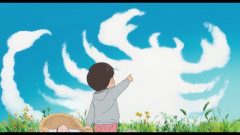
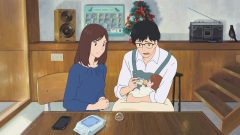
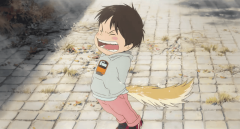

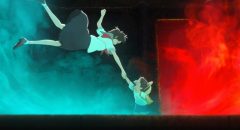
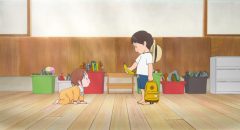
I just finished watching my Blu-Ray of it today, and I definitely agree with you on your review, though I’m personally rating it a little lower. I did genuinely like it, and I wasn’t as bothered by Kun’s tantrums as others were because, well, he’s four and four-year-olds do act like that, and for what it’s worth, he DOES get called on it (Unlike some, such as D.W. from Arthur, who rarely gets punished for anything even when she should). The reason I’m rating it lower is one thing: Can four-year-olds even understand the concept of the past, present, and future? I personally find it very hard to believe that a four-year-old would be able to understand the concept of any time that isn’t right now, especially the future, when things haven’t happened yet. I know I didn’t when I was that age. That’s the only thing about Mirai that bugged me, but not so much that I’d outright hate the movie as a whole.
I finally just watched this last night and I have never experienced an anime film that was brought down this much by the terrible voice acting. They clearly tried to go the route of using trending actors with little to no VA experience and the film suffered greatly for it. All of the lines were so flat and it was really hard to sympathize with or care about any of the characters (especially Kun, who isn’t very like-able in the first place). It’s definitely a shame because the second half of the film is pretty great. I still probably ended up liking this better than bakemono no ko, but that was probably due to my high expectations being let down.
The English dub is much better, thankfully. For one, Kun is voiced by an actual little boy and doesn’t sound like he swallowed marbles.